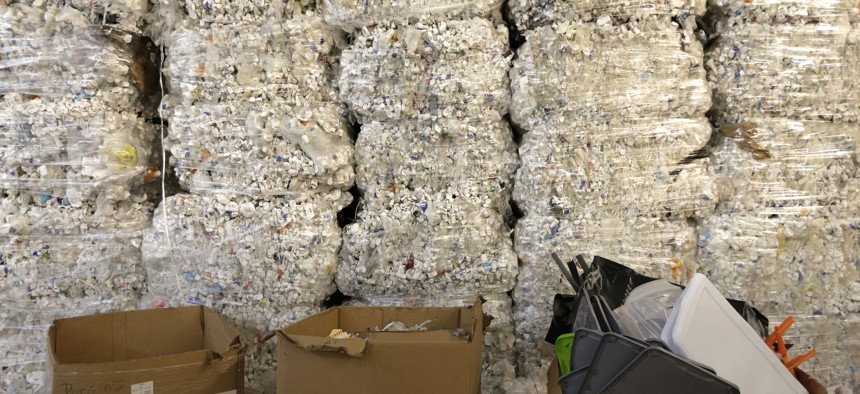Mayors Seek Solutions to Recycling Crisis

In this May 7, 2019 photo, plastic pill bottles are bundled for recycling at a GDB International warehouse in Monmouth Junction, N.J. AP Photo/Seth Wenig
Industry representatives said companies are hungry for recyclables, despite China’s loss of appetite. But they said cities need to help residents decrease contamination and can do so through education campaigns and better infrastructure.
WASHINGTON - Mayors representing cities across the United States are increasingly questioning whether their cities can continue to absorb the rising costs to recycle plastics, paper and glass.
When Schenectady, New York, recently went out to bid for a new contract to dispose of recyclables, the price jumped from $38 to $70 a ton, said Gary McCarthy, the city’s mayor.
“It’s twice as much to get rid of recyclables and it’s going to force it to go back into the trash,” he said, speaking after listening to presentations Wednesday at panel on the first day of the U.S. Conference of Mayors event.
Mayors gathered at the session to hear from federal officials and industry representatives about potential solutions to a problem that has increasingly plagued cities since China stopped accepting most foreign recyclables, including plastics and paper, in 2017.
Industry representatives asked mayors to continue supporting recycling efforts, promising that investments to modernize recycling infrastructure are on the way. The demand for recyclable materials is more than the market is currently providing, said Megan Daum, vice president of sustainability for the American Beverage Association.
For example, an initiative announced late last year by the ABA and the Recycling Partnership will invest $400 million to update recycling infrastructure in order to improve sorting, processing and collection of recycled plastics so more can be remade into drink bottles.
Infrastructure investments take time, however, and industry representatives said cities can support recycling efforts in the meantime through education campaigns meant to increase recycling rates and decrease contamination of materials.
“Consumers are confused about recycling,” Daum said.
Such initiatives can include campaigns to educate residents by having recycling specialists rummage through their recycle bins to identify any items that shouldn’t be in there, said Elisabeth Biser, vice president of public affairs for the Recycling Partnership, an industry-backed nonprofit. When specialists find non-recyclable items, they leave an “oops” tag to inform the resident.
“What we see results from is when you have education bolstered with feet on the street and personal engagement,” Biser said.
The idea is not to run oops tag programs constantly, but to use them as a reminder for residents, she said.
Biser also suggested that when municipalities purchase recycle bins, they seek out containers that are themselves made with recycled materials.
The recycling rate in the United States was 35% in 2017, according to the EPA. But since the Chinese restrictions took effect, some communities have been unable to maintain recycling programs—with recyclables instead burned or sent to landfills.
Mayors lamented that residents are getting fatigued by the increasing restrictions on existing recycling programs. During Wednesday’s panel, some questioned what federal and industry efforts are being undertaken to reduce packaging waste and improve recycling infrastructure.
Peter Wright, an assistant administrator with EPA, said the agency’s top goal in 2020 is to come up with national recycling goals that he believes will help improve systems across the country.
In Congress, lawmakers have introduced legislation that would provide funding for local governments to improve their recycling infrastructure and educate Americans about local recycling programs. Speaking on Wednesday’s panel, Sarah Peery, a legislative aide for U.S. Sen. Rob Portman, said additional legislation is in the works that would provide incentives for materials recovery facilities, which receive, separate and prepare recyclable materials.
Andrea Noble is a staff correspondent with Route Fifty.
NEXT STORY: Vast Majority of Mayors Believe Their Cities Are Too Car-Oriented, Survey Finds





